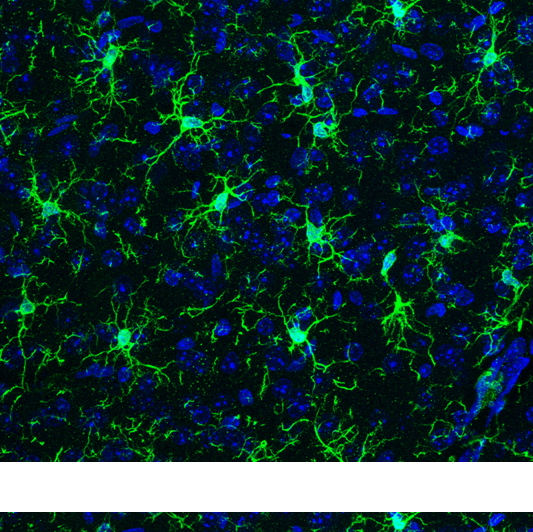
The image depicts cell nuclei (blue) and microglia (green) in the brain. Image credit: Dr Morgane Thion, IBENS, Paris.
Singapore – Scientists from A*STAR’s Singapore Immunology Network (SIgN) have discovered that age and sex have a big influence over how the gut microbiome impacts the immune cells in the brain (microglia). These findings could be critical in helping to explain the sex bias that occurs with incidents of neuro-developmental disease, such as autism, and neurodegenerative disease, such as multiple sclerosis. The team’s research was published in leading scientific journal Cell on 21 December 2017.
The gut microbiome refers to the natural ecosystem of microbes (bacteria, yeasts, and so on) that live in the digestive tract. The microbiome’s essential functions involve breaking down food, producing necessary vitamins, and training the immune system, amongst other things. Microglia refer to the immune cells in the brain that are the first line of defence against injury and infections, but they also support critical brain functions especially during a baby’s development.
Working in collaboration with the Institut de Biologie de l’École Normale Supérieure (IBENS) in Paris, the SIgN research team found that during pregnancy, if the maternal microbiome is absent, the development of microglia in male fetuses is much more seriously affected or disturbed, compared to female fetuses. Given that microglial disturbances in the prenatal stage have been linked to developmental diseases such as autism, this finding may help to shed light on why four times as many boys as girls are diagnosed with autism.
Commenting on the significance of his team’s discovery, Dr. Florent Ginhoux, Senior Principal Investigator at SIgN and co-lead researcher of the study, said: “Previous studies have pointed to the microbiome’s influence on microglia, but our study goes one step further in highlighting that this influence differs based on age and sex. This has implications for how we understand the sex biases inherent in several neurodegenerative or developmental diseases, and consequently, how we should go about understanding and treating them.”




